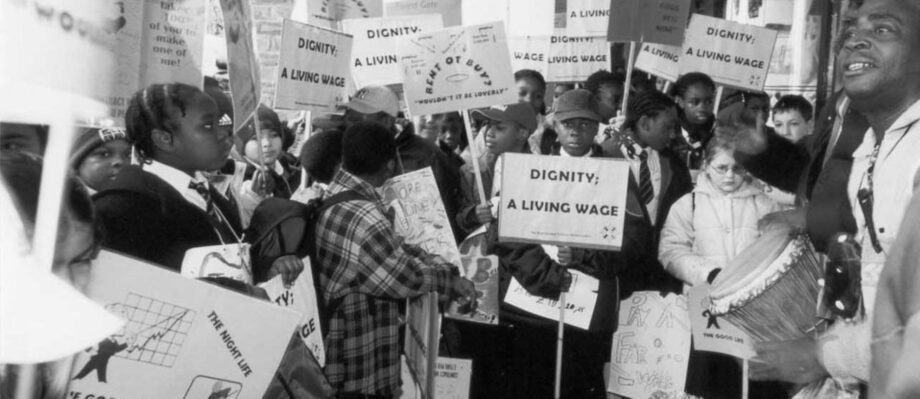October is Black History month, a time to acknowledge the significant contributions of black people in the UK and reflect on the work that still needs to be done to address racial injustice.
The current cost of living crisis is hitting those in insecure and low-paid jobs particularly hard. However, minority ethnic workers in the UK are facing disproportionate impacts as they are more likely to be paid the lowest wages. This situation is exacerbated by racial bias in hiring decisions, promotion opportunities, and pay disparities, with black workers still being paid less than their white counterparts for comparable work. These issues highlight the close connection between racial justice and economic justice.
Throughout history, Black people have been at the forefront of social justice movements in the UK, advocating for change. The Living Wage campaign, launched in 2001 by low-paid workers mainly from racialised communities, aimed to address the struggles faced by those working multiple jobs on low pay. This movement, led by individuals like Abdul Durrant, successfully advocated for fair wages, delivering over £2 billion back to low-paid workers. Despite these achievements, discrimination and structural racism continue to hinder economic parity for the Black community, especially with the rising cost of living.
Research indicates that Black workers in the UK are more likely to be paid less than the real Living Wage compared to white workers. Additionally, Black women face a higher likelihood of being on low pay, especially those in frontline roles such as social care workers, which are undervalued and underpaid. These statistics underscore the difficulties faced by thousands of Black workers struggling to make ends meet, impacting their physical and mental well-being.
Moreover, Black workers are the most likely to be in insecure work, leading to increased costs and financial unpredictability. This situation, combined with structural racism, deprives Black workers of equal career opportunities, as many report experiencing discrimination, being passed up for promotions, or being refused jobs due to their ethnicity.
While addressing pay disparities alone cannot rectify structural racism, advocating for employers to adopt a real Living Wage and provide secure hours for their staff is a crucial first step in combating the injustices faced by Black people in the UK. This commitment aligns with efforts to become an anti-racist organization, advocating for change and a fair, just workplace beyond Black History month.
For more details about our anti-racism commitment, you can visit: Our Anti-Racism commitment | Living Wage Foundation.
A note on terminology
In our research, we strive to use individual categories of ethnic groups to describe the impact of low pay. However, due to sample sizes, a catch-all term may be necessary. We use ‘Minority Ethnic’ instead of ‘Ethnic Minority’ or ‘BAME’, recognizing the complexities and nuances inherent in individual minority ethnic groups. There is a push for more disaggregated labour market data in the future to accurately analyze and report on ethnicity pay gap data.




